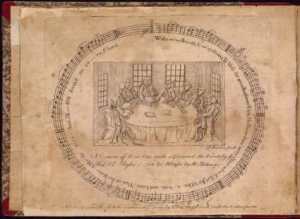William Billings - American Masterpieces: Choral Music Monday, June 13, 2011
The National Endowment for the Arts' American Masterpieces: Choral Music initiative is designed to celebrate our national musical heritage by highlighting significant American choral composers and their works of the past 250 years. Stanton's Sheet Music is proud to present this series highlighting the composers and their works featured in this groundbreaking project.
(from NEA.gov)
Bostonian William Billings (1746-1800) was a tanner by trade. Lame, blind in one eye, rude in manner, and noted for “an uncommon negligence of person,†he was nevertheless the most important American composer of choral music in the 18th century. There were composers and music arrangers before him, but none whose names are familiar to anyone but scholars of Colonial times.
Although Billings professed a free spirit (“I don't think myself confin'd to any Rules for Compositionâ€), he shared with many of his predecessors a strict adherence to the unaccompanied psalm-singing of the Calvinist Protestant tradition, i.e., “psalmody.†This music, strongly modal in flavor, was directly descended from Medieval and Renaissance choral singing. It is fascinating to find early American music more ancient in sound and structure than music of the same time in Europe, during the periods of Handel, Haydn, and Mozart.
In 1770 Billings published 120 vocal works under the title The New-England Psalm-Singer, which included a long preface of instruction. The frontispiece was engraved by none other than Paul Revere - some say he also engraved the music, but there is no proof. This was followed by more collections, the most popular being The Singing Master's Assistant of 1778, which went through four editions.
Though mostly self-taught, Billings was a natural musician of great originality (if often rough technique), who by the time of the American Revolution was being touted as “the father of our new England music.†Sadly, his last years were spent in spiraling poverty, and by the time of his death he was so far forgotten that his place of burial was unrecorded, and is unknown to the present day.
For more distinguished choral repertoire suggestions, please contact us.